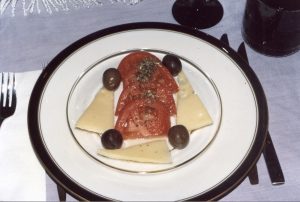This weekend our congregation celebrates the wedding of one of our members. A former president, she has worked tirelessly on behalf of the congregation. When I arrived in Elgin, her first husband was not doing well. He died on the first night of Chanukah, surrounded by friends and family.
But this weekend is for joy. And love. And romance. Smiles, laughter, maybe even giggles.
When we started this project we learned that there are many words for joy. Simcha, Osher, Ora, Gila, Rina, Ditza, Sasson, Tzahala, Chedva.
There are seven marriage blessings. The last one contains most of these words.
Baruch Atah Adonai Eloheinu Melech Ha-Olam, asher barah sasson v’simcha, chatan v’kalah, gila rina, ditza v’chedva, ahava v’achava, v’shalom v’re’ut. Me-hera Adonai Eloheinu yishama b’arei yehudah u’vchutzot yerushalayim, kol sasson v’eKol simcha, kol chatan v’ekol kalah, kol mitzhalot chatanim me-chupatam, u’nearim mimishte neginatam. Baruch Atah Adonai mesame’ach chatan im hakalah.
Blessed are You, Adonai, our God, Ruler of the universe, Who created joy and gladness, loving couples, mirth, glad song, pleasure, delight, love, loving communities, peace, and companionship. Adonai, our God, let there soon be heard in the cities of Judah and the streets of Jerusalem the sound of joy and the sound of gladness, the voice of the loving couple, the sound of the their jubilance from their canopies and of the youths from their song-filled feasts. Blessed are You Who causes the couple to rejoice, one with the other.
After this, the groom will smash a glass and the congregation will shout “Mazel tov.” There are many interpretations of why the glass is broken. The most traditional is because of the destruction of the Temple in Jerusalem. What I like to say is that at our most happy, joyous times there is still a little bit of brokenness, still a little bit of sadness missing those who came before. I am delighted that this bride has found this groom. I am thrilled they have each found happiness and joy in new love. I suspect there will not be a dry eye in the house.
I own multiple copies of Anita Diamant’s book, the New Jewish Wedding. In multiple editions. I love some of the poetry in the back, much of which is written by my Hebrew professor at Tufts, Joel Rosenberg. If you are planning a wedding, look at it.
But tonight, I offer this, as we begin to light our Shabbat candles.
From Rabbi Naomi Levy’s book, Talking to G-d
“The great rabbi Israel Baal Shem Tov once said that from every human being there rises a light that reaches straight to heaven. And when two souls that are destined to be together find each other, their streams of light flow together in a single, even brighter light that illuminates the heavens.
The marriage ceremony is the moment when two separate people unite to create one family, one future, one light.”
That is the joy and light, the simcha and ora of the wedding! It is like the two separate candles at the beginning of Shabbat, coming together as the braided candle of havadalah, when we sing from the Book of Esther, as part of havdalah, “Layehudim haita ora vesimha vesason vikar ken tihiye lanu. Grant us the blessings of light, of gladness and of honor which the miracle of deliverance brought to our ancestors.”
May this be that Shabbat. Of Light and Joy, Ora v’simcha! Mazel tov!
